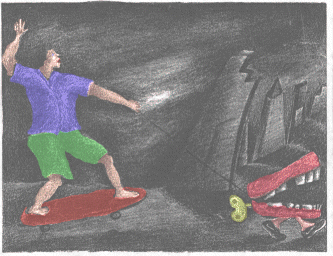 |

|
|
Perhaps we should dub it the Orthodontic Complex, this mad idea that our lives should be glamorous and gloriously free from blemish or mishap. The obsessive straightening of our teeth has become the great symbol of the Age of Cool. Archaeologists of the future will wonder why dental uprightness mattered so much, back in the 21st century. Was it a symbol of moral intent (upright teeth, upright life; tidy desk, tidy mind ... that kind of thing) ? Were they expressing a wish to change the very body that nature gave them, as a way of minimising their sense of mortality and the imperfection of human existence ? Had they confused symmetry with beauty ? It's all a terrible delusion, of course. Life is messy and teeth are as good a symbol as any of its essential messiness. Decayed and crooked and, in the end, crumbling... I think I recognise myself in there somewhere, and what's wrong with that ? There's plenty of joy to be experienced along the way, but straight teeth are no guarantee you'll find it. The orthodontic craze appears to be driven by aspirational middle-class parents who are anxious to give their children every possible advantage: Nike booties, a deluxe preschool, tennis lessons at three, a couple of musical instruments under their belt before they can read, coaching for everything... and, of course, straight teeth. But what will be the pay-off ? The bad news, dear parent, is that you'll endure just as much opprobrium when they hit their mid-teens as you would have if you'd force-fed them tripe and tapioca pudding and banned TV from the house. Hardship lies ahead for all of them - whether their teeth are crooked or straight - and there's something to be said for having to deal with it early on. The arresting opening sentence of The Fish Can Sing, the 1966 novel by Halldor Laxness, runs like this: "A wise man once said that next to losing
its mother, there is nothing more healthy for a child than to lose
its father."
That reminds me of an oft-quoted remark my mother attributed to Lord Someone-or-Other (I should have paid more attention): "I had the great advantage of disadvantage"
The downside of parents too-eager attempts to create beautiful lives for their children is the reduction of the children's capacity to absorb disappointment. No wonder kids - even middle-aged kids - are increasingly inclined to blame their own parents for their shortcomings, mistakes, failures and other miseries. The "deprived childhood" has become the great excuse ("I don't want to hear of any arsonist having had a deprived childhood," wrote one correspondent to a Sydney newspaper at the height of the bushfire crisis.) There are such things as deprived childhoods; the trick is finding one that wasn't deprived in some way. If you parents were affluent, you were overindulged; if they were poor, you felt you'd missed out. If they were smart, you were intimidated or patronised; if they were stupid, you suffered from a poor example. If they encouraged you, you were pushed too hard; if they didn't, you were neglected. Parents can't win. If they die, they leave a child marooned in a sea of pity. If they live, they're bound to make mistakes that will have scarred their offspring, one way or another, by the time they reach adulthood. Who doesn't carry the wounds of childhoods through life ? Most parents do their best, even if they scarcely know what they're doing. By their early teens, most children have already detected their parent's flaws (the deepest of which sometimes turns out to be the attempt to appear flawless). It is the fate of almost all parents to become, sooner or later, the butt of their children's mockery, despair and irritation. So what ? Parents might as well accept as part of their destiny that they'll become the reference point for their offspring's harsh judgements upon the human condition; that's a healthy phase in a child's development. The challenge is not for parents to rise above their child's displeasure or embarrassment; the challenge is for the children, as they mature, to accept they'd better work with what they've got - genetically and otherwise.
"Origins were origins," says a character in Saul
Bellow's 1982 novel The Dean's December... (This has been
a holiday for enjoying lost classics.) "You did the best you could
with them. You couldn't turn them in for a better set."
When it comes to teeth, though, you can turn them in for a better set. Long ago, I endured bands designed to straighten one of my front teeth. There was a short-term effect, but the tooth soon resumed its natural angle, where it has resolutely remained ever since, symbolizing something, I'm sure.
|